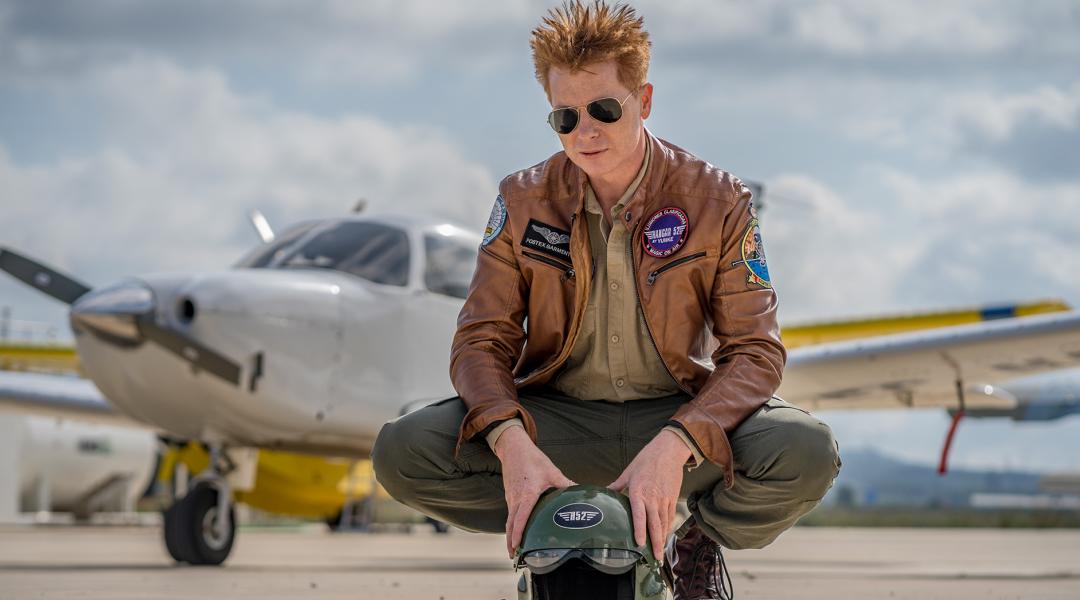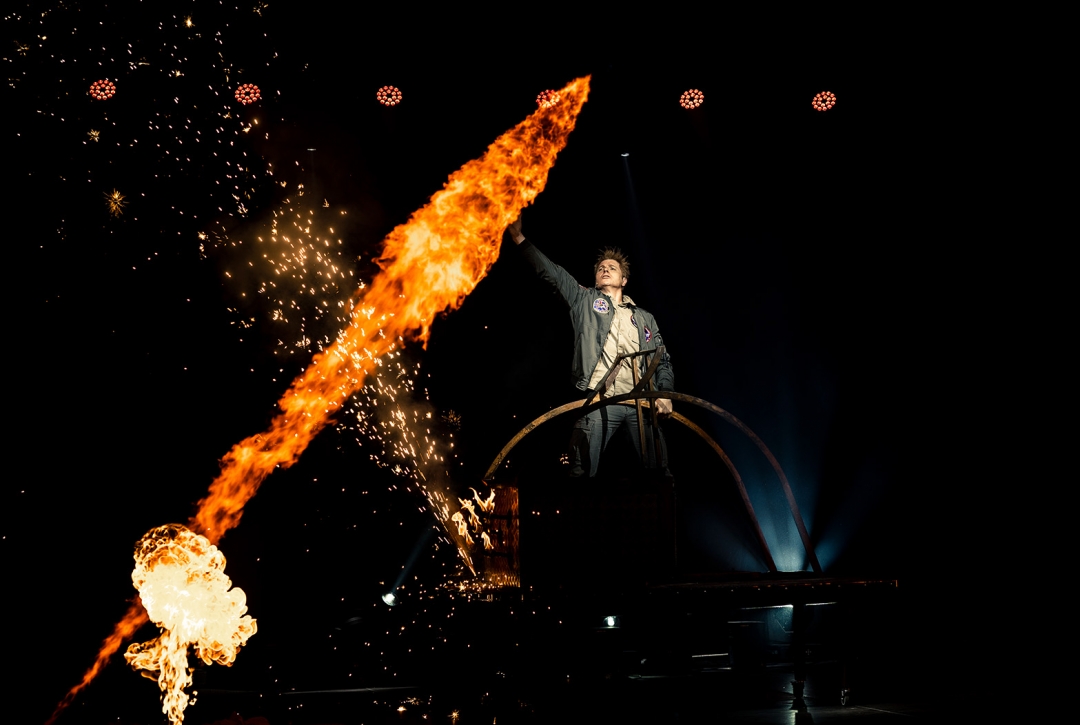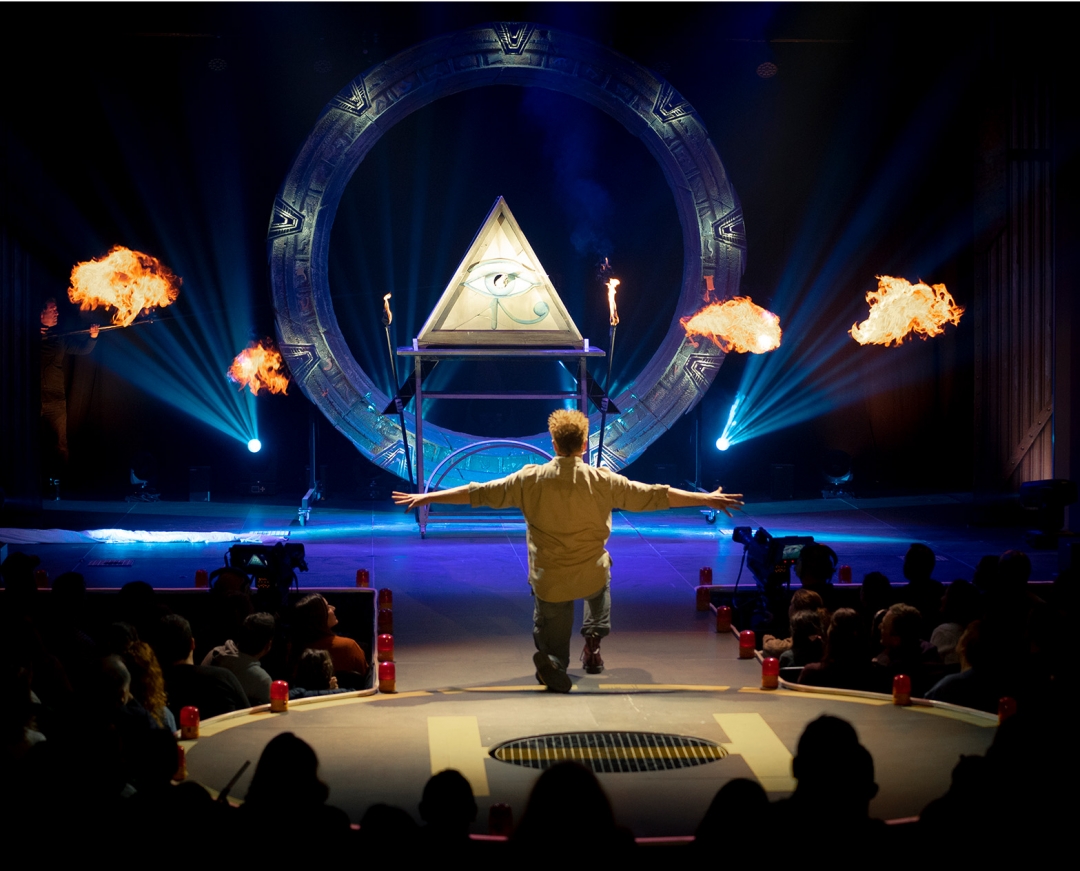Mago Yunke
The impossible illusionist

Discover the hidden secrets of Leonardo da Vinci, travel through interstellar doorways to ancient Egypt or experience a war ritual near the Great Wall of China. Inspired by traditional magic tricks, Salvador Vicent, better known as Yunke, lets his creativity run wild and leads us to impossible scenarios through his spectacular staging. The trick is called Hangar 52 Revolution. Ta-dah!
After winning the FISM World Championships of Magic twice, receiving an honourable mention from the Royal Family of Monaco and participating in a prime-time TV programme, Yunke (Castellón, 1975) still has some tricks up his sleeve. He reveals them in the second season of Hangar 52 Revolution, which has just opened at IFEMA Madrid. His spectacular staging and unique magic have made him worthy of plenty of recognition internationally, but what’s remarkable about his work is that he invents, designs and produces effects that impress an audience of 150,000 people all by himself, at his own workshop in his hometown. He calls it local magic. We simply call it talent.
An obvious question: why a magician called Yunke?
The name Yunke comes from my grandfather, he was a blacksmith and worked on an anvil (yunque in Spanish) that was always on our doorstep. When my friends used to come over, they’d say: “Let’s go to Yunque house”, which, in the end, became my stage name.
Some are passionate about writing, others about cooking or sports... Where does your passion for magic come from?
Magic is within me and I don’t know why. It was probably triggered by seeing a magic trick when I was 7 or 8 years old. It seemed to me like that person had magical powers, it was incredible. That trick awoke something within me that’s still there: a passion for the art of magic, the art of illusion. Magic has to come from within you, something inside you moves you to discover it.
Is there a particular magician that you admired at the time?
Professor Ballester, a retired magician, who was my teacher and introduced me to the profession. It’s funny, because he showed me how to shuffle with one hand, something that takes a long time to learn. I practiced constantly, hardly sleeping for a whole week, until I did it. I think it was a test to see how interested I was. Then he gave me his bag with his best tricks, which I still keep to this day. I started working with that bag, so I remember him fondly. After that, I learnt from other big names such as Juan Tamariz, Arturo de Ascanio... Great renowned magicians that we’re lucky to have in Spain.
And how do you go from performing small tricks to creating a show for an audience of more than 150,000 people?
I think everything comes from where I grew up, Villavieja. A village of 3,500 residents in the province of Castellón where everything is more accessible: I know the carpenter, the blacksmith, the painter... Anyone who can help me to create an effect.
So, this is practically local magic.
Exactly. Last night, when I was already in bed, I remembered that I hadn’t picked up a pedestal I had ordered and the carpenter let me in so that I could bring it to Madrid today. Is that even possible in a big city? Living in a village is handy if you want to devote yourself to this kind of magic.

A scene from Yunke’s show in Madrid. ©Image courtesy of Hangar 52 Revolution.
What’s your creative process like?
Since I was young, being isolated has helped me to create very personal, creative magic. If you’re always surrounded by magicians and they all speak the same language, it’s hard to stand out and do something different. In my case, solitude and peace and quiet allow me to start to create. Creativity also comes from hard work, putting a lot of hours into it helps it to grow.
“If you’re always surrounded by magicians and they all speak the same language, it’s hard to stand out and be original. In my case, solitude and peace and quiet boost my creativity”
There’s nothing like a 900-m2 lab to develop your productions.
Yes, it’s a fundamental space for me to create new effects. In my lab, I have these giant blackboards where I write all kinds of notes and doodles. That’s how I brainstorm, to create a map and be inspired at each point. I don’t think about the effect or trick itself; I think about what I’d like to see, and work on how to make it possible from there. Because if you can appear, disappear, fly, transform... You can build whatever you want from there. It does have to be an extremely dynamic show, because the audience will forgive a mistake, but never boredom.
If creativity comes from oneself, as you say, where does teamwork come into play when creating magic?
The first step comes from oneself, but it’s essential to be surrounded by a great team to help you make it come true, of course. It’d be impossible to make a show of this size without having a team of excellent professionals, but above all, good people. For me, good vibes are crucial to work well together, I want people to enjoy themselves. This also helps creativity.
The ability to move the audience and create a visual impact are indispensable in the world of magic. How do you produce these feelings within the audience?
When I started out, performances were held in large outdoor spaces, full of distractions, and the sound quality wasn’t always great. For this reason, my performances have always been really dynamic, with sudden movements, to transmit that energy to the audience. This toughens you up, because according to the size of the stage I’m on, I calculate how much I have to project and my body language changes as I feel the audience’s energy. Also, I never want there to be a lull in my performances, because a tiny distraction can lead to completely losing the audience’s attention. I want to catch the audience’s attention from the moment I come on-stage, be really expressive and captivate them with the show.
“I don’t think about the effect or trick itself; I think about what I’d like to see, and work on how to make it possible from there”
With more than 25 years’ experience, you’ve come a long way, and with the rise of new technology, showbusiness has changed radically. How has this affected magic and how do you think it’ll evolve in the future?
Human beings remain, it’s the artists that adapt. I believe that information overload often leads magicians starting out now to want to do lots of different things, but they don’t have enough time to practice to perfection. Oddly enough, and despite the boom in technology, the tricks that work the best are old-school ones that have remained over the years: Chinese linking rings, the magic umbrella, the egg that disappears in the bag... I believe there’s a lot of potential among young magicians and that we need to introduce new tricks, but without disregarding the basics. Traditional magic is imperative for the future of this art.
In this second season of your show, which has already opened in Madrid, you can see “classified illusions” or “impossible visions”. Odd names.
Yes, at Hangar 52 Revolution we reveal from Leonardo da Vinci’s untold secrets, to NASA’s weightlessness and teletransportation experiments, going through interstellar doorways in ancient Egypt, war rituals from the Great Wall of China and even missing planes from World War II. Nothing more and nothing less.
And we’ll see the “great illusion” that led you to win the FISM World Championships of Magic in Korea in 2018.
That’s right, within the section about Leonardo da Vinci, there’s a trick that won us the World Championships where I split myself in two. The incredible thing is that we don’t use cloths or boxes, like other world-renowned magicians do, rather I walk out, lean on a disc, and split myself in two, which shocked the magicians. This is something I’ve done since I was young: when I come up with a magic trick, I don’t think about impressing the audience, rather other magicians. That’s why the magic in Hangar 52 is new and original.
“When I come up with a magic trick, I think about impressing other magicians, which is why my magic is new and original”

LThe so-called “classified illusions” are one of the big mysteries that Yunke wants to reveal to us. ©Image courtesy of Hangar 52 Revolution.
You’re a two-time winner of the FISM World Championships of Magic, winner of the Spanish Magic Championship, and have even received an honourable mention from the Royal Family of Monaco. Do you think Spanish talent is well-regarded abroad?
In Spain, we have a lot of potential for magicians, especially performing stage magic and close-up magic. The level is extraordinary and this is also perceived abroad; Spain always stands out at the World Championships. To continue growing we have to take that step and go abroad. I’ve been performing around the world since 2000 and I’ve always been well received, with kindness and respect.
So, does travelling make us more creative?
It’s obvious that, the more you travel, the more knowledgeable you are and, therefore, the more you boost your creativity. Travelling broadens your mind and makes you a better artist, it’s all connected.


